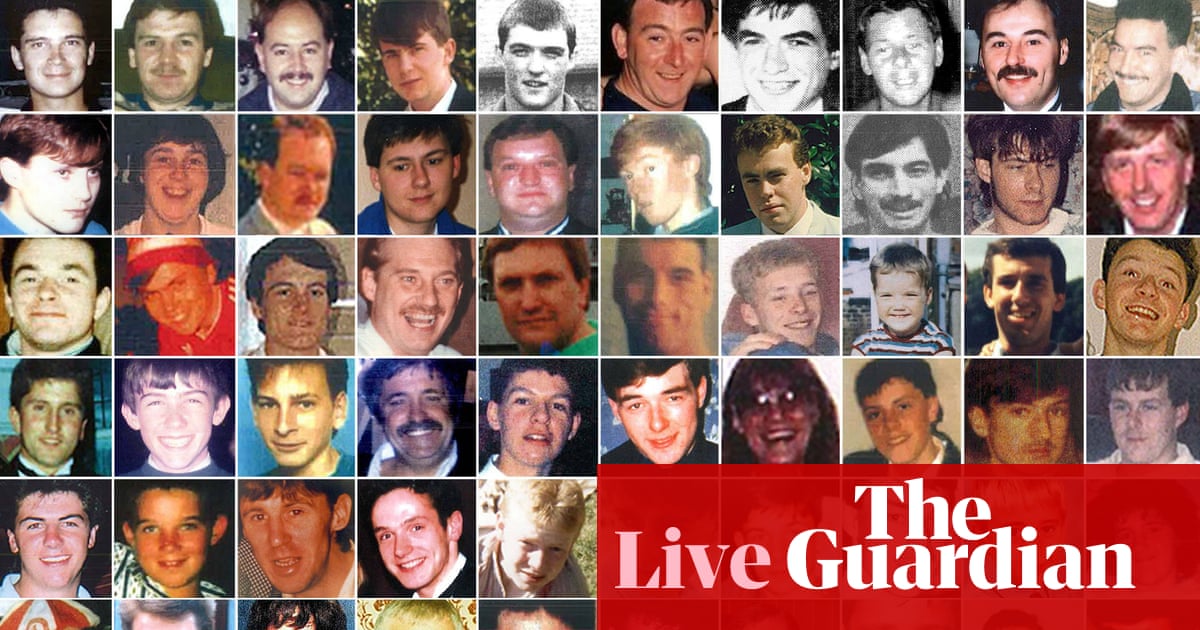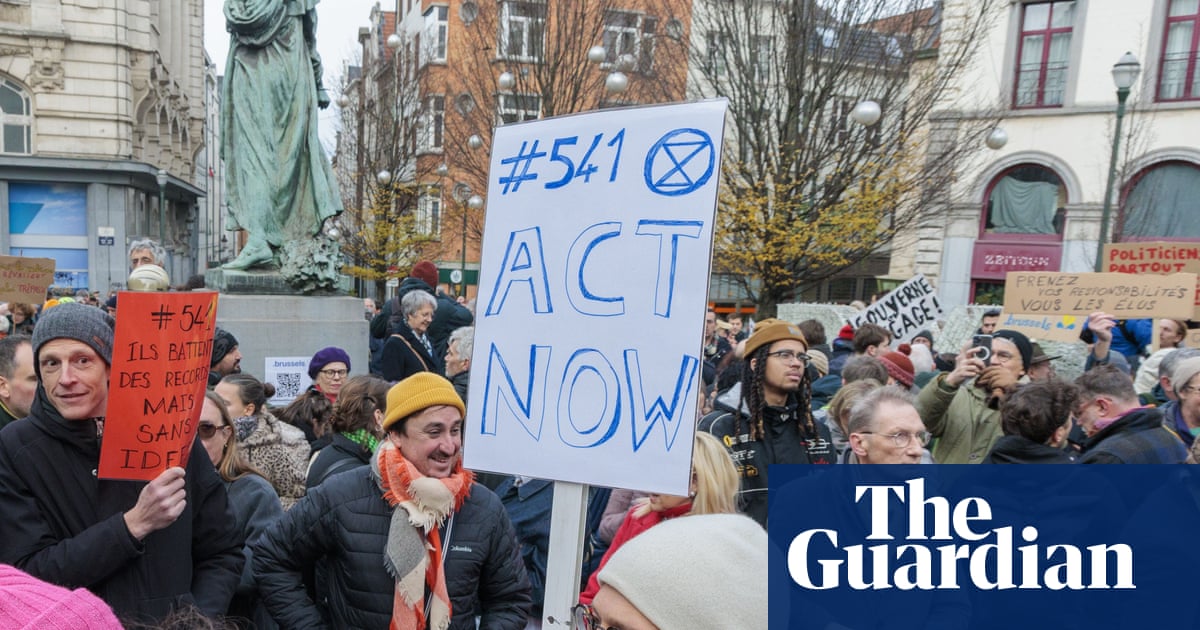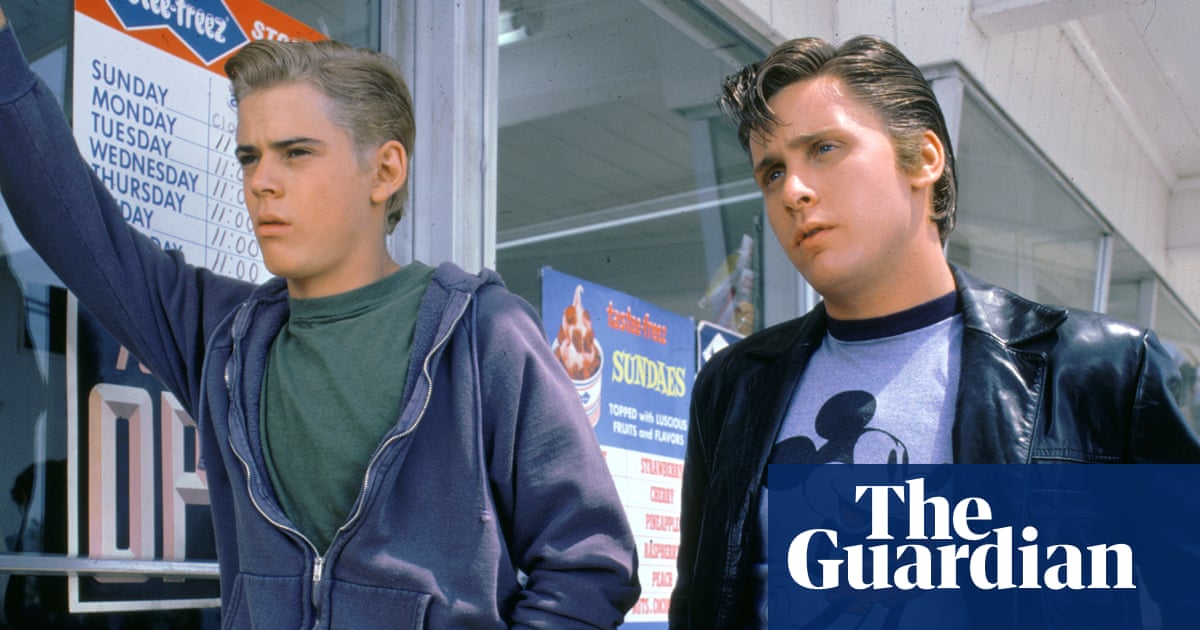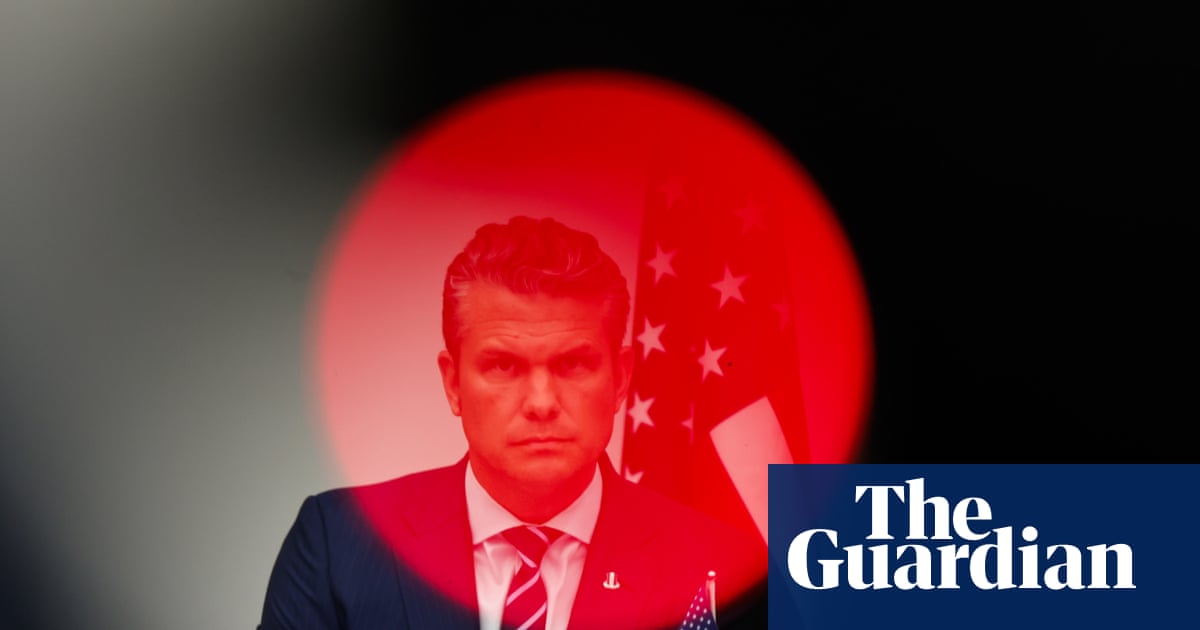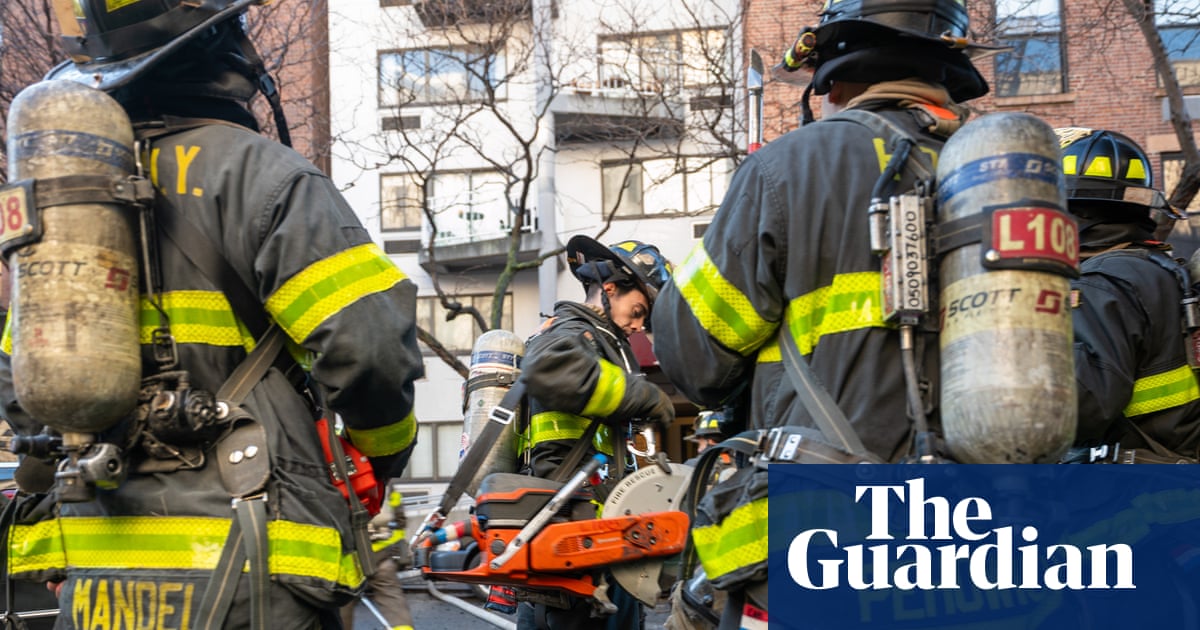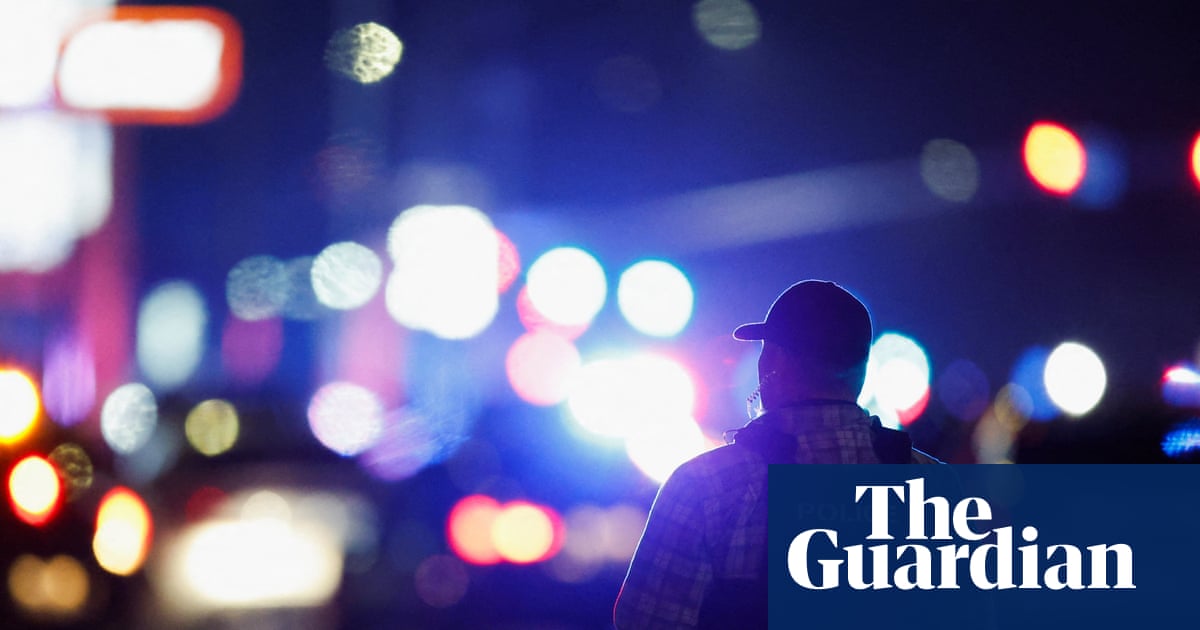Consider the great Hollywood feud. Perhaps Bette Davis and Joan Crawford’s mutual loathing comes to mind? Or Marlon Brando’s 40-year-old beef with Burt Reynolds? Maybe the more recent tensions between Olivia Wilde and Florence Pugh? Well, let me tell you: these are absolutely nothing compared to Cate Blanchett and her indefatigable animus towards … the leaf blower. Seemingly every single leaf blower.
Truly, this is one of the greatest celebrity animosities of this century. The earliest extant Blanchett-rant on the subject is a W Magazine interview, way back in 2007, when she ambiguously characterised leaf blowers – a lot of fence-sitting here – as “everything that is wrong with the human race”.
In the 18 years since, the two-time Oscar winner has ranted about leaf blowers: while munching her way through chicken wings on Hot Ones (“Gardeners, their faces … they know what they’re doing is stupid”); on Subway Takes (“Leaf blowers need to be eradicated from the face of the Earth”); during the press tour for her film Black Bag (“If you see someone with a leaf blower, doesn’t your blood pressure go up?”); and even on the red carpet at the world premiere for Where’d You Go, Bernadette (for the avoidance of doubt: “I hate them so much”). She even shoehorned them into a press conference at Cannes for a film very much not about leaf blowers (the film’s director: “This again?”).
Blanchett’s abhorrence of the leaf blower has become so renowned that she has fully leaned in, appearing in a sketch with her Borderlands co-star Gina Gershon. This passionate detestation has, as you might imagine, not gone unremarked upon by internet denizens. There are now a number of compilations of Blanchett bitching about leaf blowers, while memes abound. The actor isn’t surprised because, as she correctly asserts, “I talk about them all the time.” It’s a celeb obsession only matched by Helen Mirren constantly bringing up her sadness that Kurt Cobain died before the invention of GPS (I’m serious).
But it hasn’t escaped my notice that Blanchett is not the only A-lister made irate by the commonplace gardening device. Michael Fassbender joined her condemnation (“Bring back the rake!”) during a shared interview (to no one’s surprise, Fassbender did not introduce the topic). Danny DeVito has a hatred of leaf blowers to rival the Aussie’s. DeVito monologued on the show Lovett or Leave It: “I know everyone’s got to make a living … I used to be a gardener. We did everything with a broom – you don’t take a fucking thing and make all the noise and blow the leaves from one neighbour to the next. And then their gardener blows them back to you. And on a Saturday? Fuck you, man.”
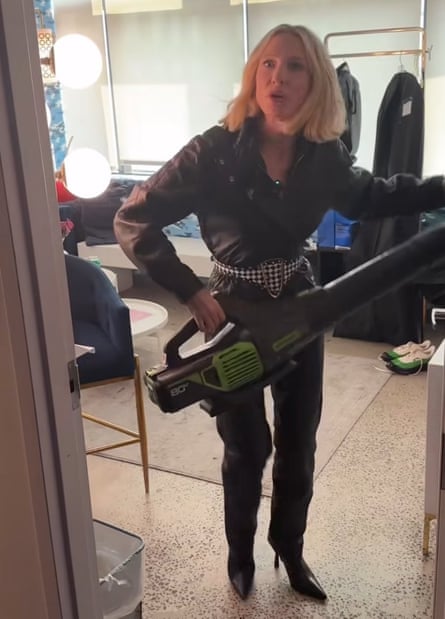
Other stars that have gone on record with their enmity? Hugh Grant, describing them in a junket as one of his pet peeves, and then doubling down – and how – telling Seth Meyers: “Anyone who uses a leaf blower, or hires anyone else to use a leaf blower, should have it rectally inserted.” This is not the sole time Grant has mooted sodomising individuals with their own garden apparatus, tweeting in 2018 that this would be a policy of his “when I am prime minister”. (Not sure that take would have made it into Love Actually, in which he played the role of PM.) In Vanity Fair’s Proust questionnaire Grant answered the question “which living person do you most despise?” with “[anyone] … who uses a leaf blower”.
Ricky Gervais? Hates ‘em. (“I want to ban leaf blowers. Why have they got leaf blowers? What are they doing? It’s bad for the environment, it’s noisy … it’s pointless,” he said on the Stick to Football podcast). Teri Hatcher, appearing on Inside the Actors Studio two decades ago, responded to “what sound or noise do you hate?” with: “I know, because it happens every Saturday morning at 7 o’clock”. Cue her impression of a leaf blower. “I just wanna yell out of my bedroom window: isn’t that illegal?!”
Tom Conti, one of Britain’s greatest living thesps, was so enraged by his neighbours’ method of lawn maintenance that he went on a Channel 4 documentary to complain, uttering the immortal line: “If these people can’t stand the sight of a leaf then it’s not a leaf blower they need; it’s a psychiatrist.” Meanwhile, Rainn Wilson, of The Office, got into a spat with Elon Musk, accusing one of the greatest villains of our time the entrepreneur of stealing his idea of a “quiet electric leaf blower”. (Musk taking credit for someone else’s ideas? Who’d have thought?)
When I am Prime Minister (it can’t be long) my first move will be to compel anyone who uses, or hires anyone to use, a leaf blower to wear it, rectally, for a week. With it switched on.
— Hugh Grant (@HackedOffHugh) October 12, 2018Never before has such an ostensibly unassuming – but, given the racket they produce, actually obnoxious – instrument brought together so many disparate Hollywood luminaries in shared seething contempt. But if Hollywood as the collective noun for industry players can be said to despise leaf blowers, so does Los Angeles the city and the surrounding LA county itself.
Beverly Hills, home to the great and the good and Ashton Kutcher, was one of the first cities to ban gas-powered leaf blowers, implementing the policy way back in 1978. West Hollywood proscribed them in 1986. Santa Monica in 1991. Los Angeles followed suit in 1998, prohibiting them within 500ft of residential property after a 12-year campaign spearheaded by Peter Graves, star of the funniest film ever made (Airplane!, obviously).
Julie Newmar, the original on-screen Catwoman, was another big name leading the charge. The Brentwood resident tried playing Mozart at full blast to block out the noise. When that didn’t work, she tried industrial strength earmuffs, but said that this made it hard for her to answer the phone. Other Newmar tactics included the distribution of DIY leaflets (“Ah, for the sound of rakes and brooms on a walk or driveway …” she wrote). Finally, she sent a letter to the then-Los Angeles mayor, threatening to move, very specifically, to New Zealand.
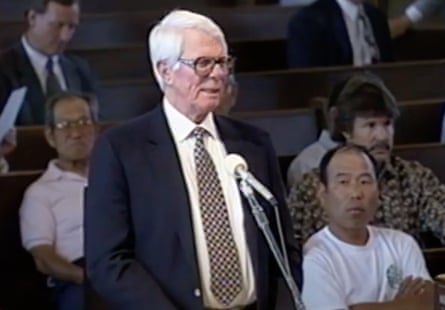
Also involved was Meredith Baxter, star of the 80s sitcom Family Ties. In one council meeting, in support of a point made by Graves and his wife concerning leaf blowers spreading not just leaves, but fungus, animal faeces and pesticides, Baxter piped up: “Are we going to put gas masks on our kids? It flies in the face of all rational thinking to continue using leaf blowers!”
Last year, in response to growing pressure, California governor Gavin Newsom issued a statewide ban on the sale of new gas-powered leaf blowers and other small off-road engines (appropriately known as SOREs), but resale, existing and electric models remain exempt. But the continuing problem, as LA has found since its ban, is the law is almost impossible to enforce; by the time police arrive on the scene (and probably don’t) the offender has moved on.
🍂🍂🍂
There are serious and justified reasons for the backlash. Traditional leaf blowers spew out carcinogens, carbon monoxide and nitrous oxide, while any leaking fuel negatively affects soil quality and wildlife. Karen Jubanyik, an associate professor at the Yale School of Medicine, calls lawn equipment “one of the greatest polluters” in the US.
As Blanchett has vehemently attested, they are “awful for the environment”, a point made too by the nature-loving Gervais. In her appearance on Subway Takes, Blanchett cited a study that claimed operating a leaf blower for just half an hour is estimated to produce the same level of pollution as driving a pickup truck from Texas to Alaska. Los Angeles in particular is a city of cars, but automobiles are becoming cleaner much faster, thanks to advancing electric vehicle technology and evolving legislation; so much so that pollution caused by SOREs could be double that of passenger cars by 2031.
The leaf blower’s impact on mental and physical health is also substantial. They can produce noise levels of up to 112 decibels; louder than a rock concert; slightly louder than someone shouting down your ear; and not far behind a jet taking off from an airport. The World Health Organization warns that prolonged exposure to noise about 85 decibels can cause irreversible hearing loss.
And the health impacts of noise pollution go beyond the aural. Charlotte Clark, a professor of environmental epidemiology at City St George’s, University of London, explains to me that environmental noise triggers biological responses in an individual. Here’s the science behind Blanchett et al’s rage: “Annoyance is a stress response to noise,” says Clark. “When sound enters the ears, it is interpreted by the amygdala in the brain – which handles endocrine and autonomic functions. If the amygdala is over-activated by noise, the endocrine system will increase levels of the stress hormones, cortisol and adrenaline. The sympathetic nervous system will also be hyper-activated.”
Blanchett is correct about her rising blood pressure. Clark mentions that these biological responses, “triggered over a long time period are risk factors for cardio-metabolic diseases such as type 2 diabetes, heart attacks and strokes.” One study by the London School of Hygiene & Tropical Medicine even linked certain types of noise pollution to higher rates of early death.
Then there are the mental health effects: depression, anxiety, sensory overload, cognitive decline. Interestingly, Stephen Stansfeld, an emeritus professor of psychiatry who helped create the WHO guidelines on noise pollution in Europe, tells me that an added irritant when it comes to noise is any sense of arbitrariness: “One of the factors that contributes to annoyance is the necessity or usefulness of the activity causing the noise. Thus, if people feel the activity, such as leaf blowing, is unnecessary, it is likely to be more annoying.”

This seems very much to be the case with Blanchett (“the wind is just gonna blow it back!”), Gervais (“it’s pointless!”) and DeVito (“these leaves are getting a great ride”) in particular.
But not everyone in the Hollywood Hills is on the anti-blower side of the hedge. For obvious reasons, landscaping companies (think of the Outdoor Power Equipment Institute (OPEI) as Big Leaf) and their employees push back. The blower was first introduced in the state after the droughts of the 1970s, when residents stopped hosing down their lawns and driveways in an effort to conserve water. Spotting a gap in the market, Japanese company Echo Inc introduced the wearable “clean-up machine”.
Back then, many gardeners in the Los Angeles area were Japanese-American, but current workers are often low-paid and of Latino descent: jardineros. They argue that their work is much more laborious without the use of blowers, and that electric ones are nowhere near as efficient (there’s also an environmental impact there, too, with the issue of battery disposal). Some workers resent that blowers are deemed a nuisance by the same residents who demand perfect lawns in record time.
In 1998, fighting against the Peter Graves-led campaign, 12 workers from the Association of Latin American Gardeners of Los Angeles (ALAGA) camped outside the city hall and even went on hunger strike in an attempt to overturn the ban. Their victory wasn’t full-blown, but they did manage to lessen proposed punitive measures (for instance, potential six-month jail terms).
Patrick Shen, director of the award-winning documentary In Pursuit of Silence, which explores the “deeply unsatisfying, unhealthy” effects of “our rapid-fire rhythms, the constant stimulation, and the ceaseless cacophony of noise around us all the time”, is sympathetic.
Shen, who lives in a Los Angeles suburb, tells me: “On any given day, there’s a leaf blower somewhere disrupting what otherwise is a decently quiet neighbourhood. I fully support the legislation – so long as there are sizeable rebates available to landscapers to trade in their old gas-powered units. The burden most certainly shouldn’t be on these hard-working people.”
🍁🍁🍁
The ubiquity of leaf blowers and the strong emotions they provoke has proved fertile on-screen inspiration. There’s the critically acclaimed coming-of-age film Sopladora de Hojas (Leaf Blower), by Alejandro Iglesias, in which a group of Mexican teens search for lost keys in a pile of leaves. Then there’s Leafblowers: a gorgeously shot short film from Nowness which explores the “rising tension against a familiar hum” with LA director CG Watkins working with composer Billy Bultheel to push the sound of the machines “to an overwhelming level”. The protagonist, awoken by the surging burr, pops headache pills with a look of utter defeat and grips the edge of a kitchen unit, as masked workers dressed ominously all in black swing what look like the trunks of fighting elephants.
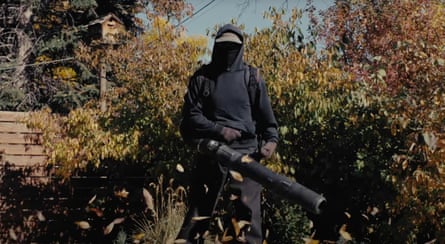
Another short Leaf Blower Massacre (tagline: “When autumn arrives, no-one survives”), pays homage to the Texas Chainsaw Massacre. And then there’s Leaf Blower Massacre 2. (Presumably some people did, in fact, survive.)
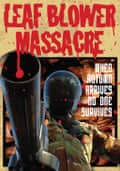
The blower also has its place behind the camera. It can serve as such a handy low-budget prop that online tutorials for film-makers and SFX departments are plentiful. Often they’re used for supernatural effects or to cultivate an eerie atmosphere. (It’s quite possible this (not low budget) scene in Lord of the Rings utilised one, in addition to CGI.) There’s even a debate as to whether one of the most iconic movie scenes – American Beauty’s plastic bag dancing in the wind – was created with the help of a leaf blower. Then there’s the manufactured glamour employment: flowing hair in adverts and high-end photoshoots (spot the man in singlet and jeans blasting Margaret Qualley in this iD shoot).
One usage Los Angeles citizens can get on board with is a more recent innovation. This summer anti-ICE protesters met the national guard on the streets of the city while “wielding leaf blowers” in a bid to disperse teargas. Or rather: “Mexican mom reveals sneaky riot tactic”, as one newspaper put it.
And there is one big movie star who has spoken of the leaf blower in non-combative terms. David Oyelowo, who lives in the San Fernando Valley, north of Hollywood, once told a story on The Daily Show about his late father’s love of the devices. “He’s got, like, four different leaf blowers. The problem is he never does the constant vroooooom. He goes vrooom … vrooom … vrooom … ”, Oyelowo said, imitating a staccato technique. “So for the hour that he’s doing this … oh man.”
For the love of God, nobody tell Cate.

 2 months ago
64
2 months ago
64
